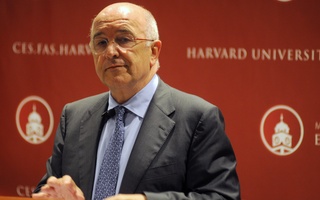{shortcode-abf4eaa24b44d986a582d8e9cfd123bfefd6e0ec}Christine M. O. Lagarde, Managing Director of the International Monetary Fund, painted a rosy picture of the global economy—though with reservations about continued prosperity—at the Institute of Politics Thursday.
A French lawyer and politician, Lagarde worked for four years as the Fund's Minister of Finance before becoming the first female director of the IMF in 2011. The organization seeks to promote economic stability around the world.
“The long awaited global recovery is taking root,” she said, describing the organization’s official global economic outlook, scheduled for release late next week, as “even more optimistic.”
Though economic conditions are improving and more jobs are being created around the world, she indicated that the recovery was not complete.
“Some countries are growing way too slowly. We have at the moment more than 47 countries where growth is actually negative on a per-capita basis,” she said.
Lagarde also urged countries to take advantage of relatively calm economic waters to invest in economies and implement structural reforms. “Reforms are more potent and easier to implement when economies are healthier,” she said.
“We are saying that those countries that are in clear surplus or close to surplus should definitely take advantage of that,” she said. “For those economies where the debt is clearly up we believe that it’s not time to have any fiscal expansion and it’s time to at least stabilize and try to reduce the deficit.”
Joined by former University President Lawrence H. Summers on stage after her address, she fielded questions about topics including bitcoin, law firm recruiting, Universal Basic Income, current GOP tax proposals, and the gender wage gap.
“I am very interested in making sure we can quantify the gains that come from women’s empowerment… because if we can quantify it we can make it very [compelling],” Lagarde said.
Alluding to tax reform bills in Congress, Summers asked Lagarde about a “hypothetical nation” that “would raise projected budget deficits over 10 years by, just to pick some numbers that I heard somewhere, 1.5 to 2 trillion dollars?”
“Well because I don’t have enough details about that tax reform in that dystopian country of yours, I’m not going to pass judgement on that,” Lagarde replied.
Ted G. Waechter ’18, a Crimson Editorial editor, asked Lagarde about what he viewed as the IMF’s “neocolonial” practices. Lagarde disagreed, citing the IMF’s role in encouraging helpful but difficult reforms in countries.
Lagarde concluded with what she called her address’s “bottom line.”
“Policymakers should use all tools at their disposal to act now, and take advantage of the period of global growth. As I said, let us not let a good recovery go to waste,” she said
—Staff writer Lucas Ward can be reached at lucas.ward@thecrimson.com. Follow him on twitter at @LucaspfWard.
Read more in News
CS50 Sees Uptick in Sat/Unsat Students After Policy ChangeRecommended Articles
-
2200 University Employees Win Wage Increases In CompromiseSix weeks of negotiations between the Harvard University Employees' Representative Association and the College Administration bore fruit yesterday when the
-
 European Antitrust Chief Advocates Cooperation, European Common Market
European Antitrust Chief Advocates Cooperation, European Common Market -
Commence the ProtestsRather than naming a name and then sitting silent, universities should play a more active role in refereeing the campus discussion.
-
Researchers Develop First Global Risk Model for Cardiovascular DiseaseThe project compiled data from eight preexisting cohort studies and aims to improve allotment of resources and disease treatment in low-income countries, according to the first authors.
-
Making the World Safer by Whipping DiseaseWhen Americans help make people in developing nations healthier, we not only fulfill a deeply moral humanitarian mission, but we also make the world—including the U.S. itself—much more secure.













